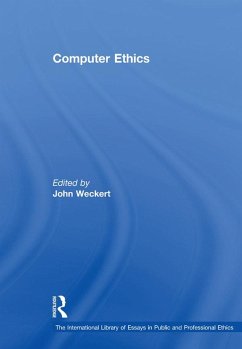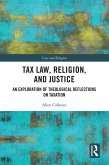Computer Ethics (eBook, PDF)
Redaktion: Weckert, John
50,95 €
50,95 €
inkl. MwSt.
Sofort per Download lieferbar

25 °P sammeln
50,95 €
Als Download kaufen

50,95 €
inkl. MwSt.
Sofort per Download lieferbar

25 °P sammeln
Jetzt verschenken
Alle Infos zum eBook verschenken
50,95 €
inkl. MwSt.
Sofort per Download lieferbar
Alle Infos zum eBook verschenken

25 °P sammeln
Computer Ethics (eBook, PDF)
Redaktion: Weckert, John
- Format: PDF
- Merkliste
- Auf die Merkliste
- Bewerten Bewerten
- Teilen
- Produkt teilen
- Produkterinnerung
- Produkterinnerung

Bitte loggen Sie sich zunächst in Ihr Kundenkonto ein oder registrieren Sie sich bei
bücher.de, um das eBook-Abo tolino select nutzen zu können.
Hier können Sie sich einloggen
Hier können Sie sich einloggen
Sie sind bereits eingeloggt. Klicken Sie auf 2. tolino select Abo, um fortzufahren.

Bitte loggen Sie sich zunächst in Ihr Kundenkonto ein oder registrieren Sie sich bei bücher.de, um das eBook-Abo tolino select nutzen zu können.
These essays focus on the study of the ethical issues related to computer use. Grouped into sections, the essays cover all the important issues ranging from the history and nature of computer ethics, cyberspace, values and technology, and responsibility and professionalism, to privacy and surveillance, what computers should not do, and morality and machines.
- Geräte: PC
- mit Kopierschutz
- eBook Hilfe
- Größe: 34.55MB
Andere Kunden interessierten sich auch für
![Ethics and Socially Responsible Investment (eBook, PDF) Ethics and Socially Responsible Investment (eBook, PDF)]() William RansomeEthics and Socially Responsible Investment (eBook, PDF)52,95 €
William RansomeEthics and Socially Responsible Investment (eBook, PDF)52,95 €![Ethics and Professionalism in Healthcare (eBook, PDF) Ethics and Professionalism in Healthcare (eBook, PDF)]() Ethics and Professionalism in Healthcare (eBook, PDF)42,95 €
Ethics and Professionalism in Healthcare (eBook, PDF)42,95 €![Tax Law, Religion, and Justice (eBook, PDF) Tax Law, Religion, and Justice (eBook, PDF)]() Allen CalhounTax Law, Religion, and Justice (eBook, PDF)42,95 €
Allen CalhounTax Law, Religion, and Justice (eBook, PDF)42,95 €![Integrity Systems for Occupations (eBook, PDF) Integrity Systems for Occupations (eBook, PDF)]() Andrew AlexandraIntegrity Systems for Occupations (eBook, PDF)52,95 €
Andrew AlexandraIntegrity Systems for Occupations (eBook, PDF)52,95 €![The Global Horseracing Industry (eBook, PDF) The Global Horseracing Industry (eBook, PDF)]() Phil McmanusThe Global Horseracing Industry (eBook, PDF)57,95 €
Phil McmanusThe Global Horseracing Industry (eBook, PDF)57,95 €![Absolute Poverty and Global Justice (eBook, PDF) Absolute Poverty and Global Justice (eBook, PDF)]() Michael SchrammAbsolute Poverty and Global Justice (eBook, PDF)53,95 €
Michael SchrammAbsolute Poverty and Global Justice (eBook, PDF)53,95 €![Globalisation and Business Ethics (eBook, PDF) Globalisation and Business Ethics (eBook, PDF)]() Karl HomannGlobalisation and Business Ethics (eBook, PDF)42,95 €
Karl HomannGlobalisation and Business Ethics (eBook, PDF)42,95 €-
-
-
These essays focus on the study of the ethical issues related to computer use. Grouped into sections, the essays cover all the important issues ranging from the history and nature of computer ethics, cyberspace, values and technology, and responsibility and professionalism, to privacy and surveillance, what computers should not do, and morality and machines.
Dieser Download kann aus rechtlichen Gründen nur mit Rechnungsadresse in A, B, BG, CY, CZ, D, DK, EW, E, FIN, F, GR, HR, H, IRL, I, LT, L, LR, M, NL, PL, P, R, S, SLO, SK ausgeliefert werden.
Produktdetails
- Produktdetails
- Verlag: Taylor & Francis eBooks
- Seitenzahl: 516
- Erscheinungstermin: 15. Mai 2017
- Englisch
- ISBN-13: 9781351949828
- Artikelnr.: 48419677
- Verlag: Taylor & Francis eBooks
- Seitenzahl: 516
- Erscheinungstermin: 15. Mai 2017
- Englisch
- ISBN-13: 9781351949828
- Artikelnr.: 48419677
- Herstellerkennzeichnung Die Herstellerinformationen sind derzeit nicht verfügbar.
John Weckert is a Professorial Fellow at the Centre for Applied Philosophy and Public Ethics, Charles Sturt University, Australia.
Contents: Series Preface; Introduction; Part I Computer Ethics - Its History and Nature: Ethical challenges to citizens of 'the automatic age': Norbert Wiener on the information society
Terrell Ward Bynum; Some Moral and technical consequences of automation
Norbert Wiener; Rules of ethics in information processing
Donn B Parker; The 2 cultures of the computer age
Joseph Weizenbaum; On the impact of the computer on society: how does one insult a machine?
Joseph Weizenbaum; What is computer ethics?
James H. Moor; 4 ethical issues of the information age
Richard O. Mason; Is there an ethics of computing?
Geoffrey Brown; The use and abuse of computer ethics
Donald Gotterbarn; Information ethics: on the philosophical foundations of computer ethics
Luciano Floridi. Part II Cyberspace: Balancing intellectual property rights and the intellectual commons: a Lockean analysis
Herman T. Tavani; What is so bad about internet content regulation?
John Weckert; Unreal friends
Dean Cocking and Steve Matthews; Developing trust on the internet
Victoria McGreer; The computer revolution and the problem of global ethics
Krystyna Gorniak-Kocikowska; Computer-mediated colonization
the renaissance
and educational imperatives for an intercultural global village
Charles Ess; Shaping the web: why the politics of search engines matters
Lucas D. Introna and Helen Nissenbaum; Part III Values and Technology: Do artefacts have politics?
Langdon Winner; Towards ethical principles for designing politico-administrative information systems
M.J. van den Hoven; Bias in computer systems
Batya Friedman and Helen Nissenbaum; Method in computer ethics: towards a multi-level interdisciplinary approach
Philip Brey. Part IV Responsibility and Professionalism: Human agency and responsible computing: implications for computer system design
Batya Friedman and Peter H. Kahn Jr ; Informatics and professional responsibility
David Gotterbarn; Do engineers have social responsibilities?
Deborah G. Johnson; Computing and accountability
Helen Nissenbaum; Using the new ACM code of ethics in decision making
Ronald E. Anderson
Deborah G. Johnson
Donald Gotterbarn and Judith Perolle. Part V Privacy and Surveillance: Are computer hacker break-ins ethical?
Eugene H. Spafford; A moral approach to electronic patient records
N.B. Fairweather and S. Rogerson; Privacy and the varieties of informational wrongdoing
Jeroen van den Hoven; Protecting privacy in an information age: the problem of privacy in public
Helen Nissenbaum; Privacy
the workplace and the internet
Seumas Miller and John Weckert; Surveillance in employment: the case of teleworking
N. Ben Fairweather. Part VI What Computers Should Not Do: Are there decisions computers should never make? James H. Moore; Computers in control: rational transfer of authority or irresponsible abdication of autonomy? Arthur Kuflik; On becoming redundant or what computers shouldn't do
James Lenman. Part VII Morality and Machines: Men
machines
materialism
and morality
Peter T. Manicas; Can robots be moral?
Laszlo Versenyi ; A code of conduct for robots coexisting with human beings
Shigeo Hirose; Information
ethics
and computers: the problem of autonomous moral agents
Bernd Carsten Stahl; Name Index.
Terrell Ward Bynum; Some Moral and technical consequences of automation
Norbert Wiener; Rules of ethics in information processing
Donn B Parker; The 2 cultures of the computer age
Joseph Weizenbaum; On the impact of the computer on society: how does one insult a machine?
Joseph Weizenbaum; What is computer ethics?
James H. Moor; 4 ethical issues of the information age
Richard O. Mason; Is there an ethics of computing?
Geoffrey Brown; The use and abuse of computer ethics
Donald Gotterbarn; Information ethics: on the philosophical foundations of computer ethics
Luciano Floridi. Part II Cyberspace: Balancing intellectual property rights and the intellectual commons: a Lockean analysis
Herman T. Tavani; What is so bad about internet content regulation?
John Weckert; Unreal friends
Dean Cocking and Steve Matthews; Developing trust on the internet
Victoria McGreer; The computer revolution and the problem of global ethics
Krystyna Gorniak-Kocikowska; Computer-mediated colonization
the renaissance
and educational imperatives for an intercultural global village
Charles Ess; Shaping the web: why the politics of search engines matters
Lucas D. Introna and Helen Nissenbaum; Part III Values and Technology: Do artefacts have politics?
Langdon Winner; Towards ethical principles for designing politico-administrative information systems
M.J. van den Hoven; Bias in computer systems
Batya Friedman and Helen Nissenbaum; Method in computer ethics: towards a multi-level interdisciplinary approach
Philip Brey. Part IV Responsibility and Professionalism: Human agency and responsible computing: implications for computer system design
Batya Friedman and Peter H. Kahn Jr ; Informatics and professional responsibility
David Gotterbarn; Do engineers have social responsibilities?
Deborah G. Johnson; Computing and accountability
Helen Nissenbaum; Using the new ACM code of ethics in decision making
Ronald E. Anderson
Deborah G. Johnson
Donald Gotterbarn and Judith Perolle. Part V Privacy and Surveillance: Are computer hacker break-ins ethical?
Eugene H. Spafford; A moral approach to electronic patient records
N.B. Fairweather and S. Rogerson; Privacy and the varieties of informational wrongdoing
Jeroen van den Hoven; Protecting privacy in an information age: the problem of privacy in public
Helen Nissenbaum; Privacy
the workplace and the internet
Seumas Miller and John Weckert; Surveillance in employment: the case of teleworking
N. Ben Fairweather. Part VI What Computers Should Not Do: Are there decisions computers should never make? James H. Moore; Computers in control: rational transfer of authority or irresponsible abdication of autonomy? Arthur Kuflik; On becoming redundant or what computers shouldn't do
James Lenman. Part VII Morality and Machines: Men
machines
materialism
and morality
Peter T. Manicas; Can robots be moral?
Laszlo Versenyi ; A code of conduct for robots coexisting with human beings
Shigeo Hirose; Information
ethics
and computers: the problem of autonomous moral agents
Bernd Carsten Stahl; Name Index.
Contents: Series Preface; Introduction; Part I Computer Ethics - Its History and Nature: Ethical challenges to citizens of 'the automatic age': Norbert Wiener on the information society
Terrell Ward Bynum; Some Moral and technical consequences of automation
Norbert Wiener; Rules of ethics in information processing
Donn B Parker; The 2 cultures of the computer age
Joseph Weizenbaum; On the impact of the computer on society: how does one insult a machine?
Joseph Weizenbaum; What is computer ethics?
James H. Moor; 4 ethical issues of the information age
Richard O. Mason; Is there an ethics of computing?
Geoffrey Brown; The use and abuse of computer ethics
Donald Gotterbarn; Information ethics: on the philosophical foundations of computer ethics
Luciano Floridi. Part II Cyberspace: Balancing intellectual property rights and the intellectual commons: a Lockean analysis
Herman T. Tavani; What is so bad about internet content regulation?
John Weckert; Unreal friends
Dean Cocking and Steve Matthews; Developing trust on the internet
Victoria McGreer; The computer revolution and the problem of global ethics
Krystyna Gorniak-Kocikowska; Computer-mediated colonization
the renaissance
and educational imperatives for an intercultural global village
Charles Ess; Shaping the web: why the politics of search engines matters
Lucas D. Introna and Helen Nissenbaum; Part III Values and Technology: Do artefacts have politics?
Langdon Winner; Towards ethical principles for designing politico-administrative information systems
M.J. van den Hoven; Bias in computer systems
Batya Friedman and Helen Nissenbaum; Method in computer ethics: towards a multi-level interdisciplinary approach
Philip Brey. Part IV Responsibility and Professionalism: Human agency and responsible computing: implications for computer system design
Batya Friedman and Peter H. Kahn Jr ; Informatics and professional responsibility
David Gotterbarn; Do engineers have social responsibilities?
Deborah G. Johnson; Computing and accountability
Helen Nissenbaum; Using the new ACM code of ethics in decision making
Ronald E. Anderson
Deborah G. Johnson
Donald Gotterbarn and Judith Perolle. Part V Privacy and Surveillance: Are computer hacker break-ins ethical?
Eugene H. Spafford; A moral approach to electronic patient records
N.B. Fairweather and S. Rogerson; Privacy and the varieties of informational wrongdoing
Jeroen van den Hoven; Protecting privacy in an information age: the problem of privacy in public
Helen Nissenbaum; Privacy
the workplace and the internet
Seumas Miller and John Weckert; Surveillance in employment: the case of teleworking
N. Ben Fairweather. Part VI What Computers Should Not Do: Are there decisions computers should never make? James H. Moore; Computers in control: rational transfer of authority or irresponsible abdication of autonomy? Arthur Kuflik; On becoming redundant or what computers shouldn't do
James Lenman. Part VII Morality and Machines: Men
machines
materialism
and morality
Peter T. Manicas; Can robots be moral?
Laszlo Versenyi ; A code of conduct for robots coexisting with human beings
Shigeo Hirose; Information
ethics
and computers: the problem of autonomous moral agents
Bernd Carsten Stahl; Name Index.
Terrell Ward Bynum; Some Moral and technical consequences of automation
Norbert Wiener; Rules of ethics in information processing
Donn B Parker; The 2 cultures of the computer age
Joseph Weizenbaum; On the impact of the computer on society: how does one insult a machine?
Joseph Weizenbaum; What is computer ethics?
James H. Moor; 4 ethical issues of the information age
Richard O. Mason; Is there an ethics of computing?
Geoffrey Brown; The use and abuse of computer ethics
Donald Gotterbarn; Information ethics: on the philosophical foundations of computer ethics
Luciano Floridi. Part II Cyberspace: Balancing intellectual property rights and the intellectual commons: a Lockean analysis
Herman T. Tavani; What is so bad about internet content regulation?
John Weckert; Unreal friends
Dean Cocking and Steve Matthews; Developing trust on the internet
Victoria McGreer; The computer revolution and the problem of global ethics
Krystyna Gorniak-Kocikowska; Computer-mediated colonization
the renaissance
and educational imperatives for an intercultural global village
Charles Ess; Shaping the web: why the politics of search engines matters
Lucas D. Introna and Helen Nissenbaum; Part III Values and Technology: Do artefacts have politics?
Langdon Winner; Towards ethical principles for designing politico-administrative information systems
M.J. van den Hoven; Bias in computer systems
Batya Friedman and Helen Nissenbaum; Method in computer ethics: towards a multi-level interdisciplinary approach
Philip Brey. Part IV Responsibility and Professionalism: Human agency and responsible computing: implications for computer system design
Batya Friedman and Peter H. Kahn Jr ; Informatics and professional responsibility
David Gotterbarn; Do engineers have social responsibilities?
Deborah G. Johnson; Computing and accountability
Helen Nissenbaum; Using the new ACM code of ethics in decision making
Ronald E. Anderson
Deborah G. Johnson
Donald Gotterbarn and Judith Perolle. Part V Privacy and Surveillance: Are computer hacker break-ins ethical?
Eugene H. Spafford; A moral approach to electronic patient records
N.B. Fairweather and S. Rogerson; Privacy and the varieties of informational wrongdoing
Jeroen van den Hoven; Protecting privacy in an information age: the problem of privacy in public
Helen Nissenbaum; Privacy
the workplace and the internet
Seumas Miller and John Weckert; Surveillance in employment: the case of teleworking
N. Ben Fairweather. Part VI What Computers Should Not Do: Are there decisions computers should never make? James H. Moore; Computers in control: rational transfer of authority or irresponsible abdication of autonomy? Arthur Kuflik; On becoming redundant or what computers shouldn't do
James Lenman. Part VII Morality and Machines: Men
machines
materialism
and morality
Peter T. Manicas; Can robots be moral?
Laszlo Versenyi ; A code of conduct for robots coexisting with human beings
Shigeo Hirose; Information
ethics
and computers: the problem of autonomous moral agents
Bernd Carsten Stahl; Name Index.







